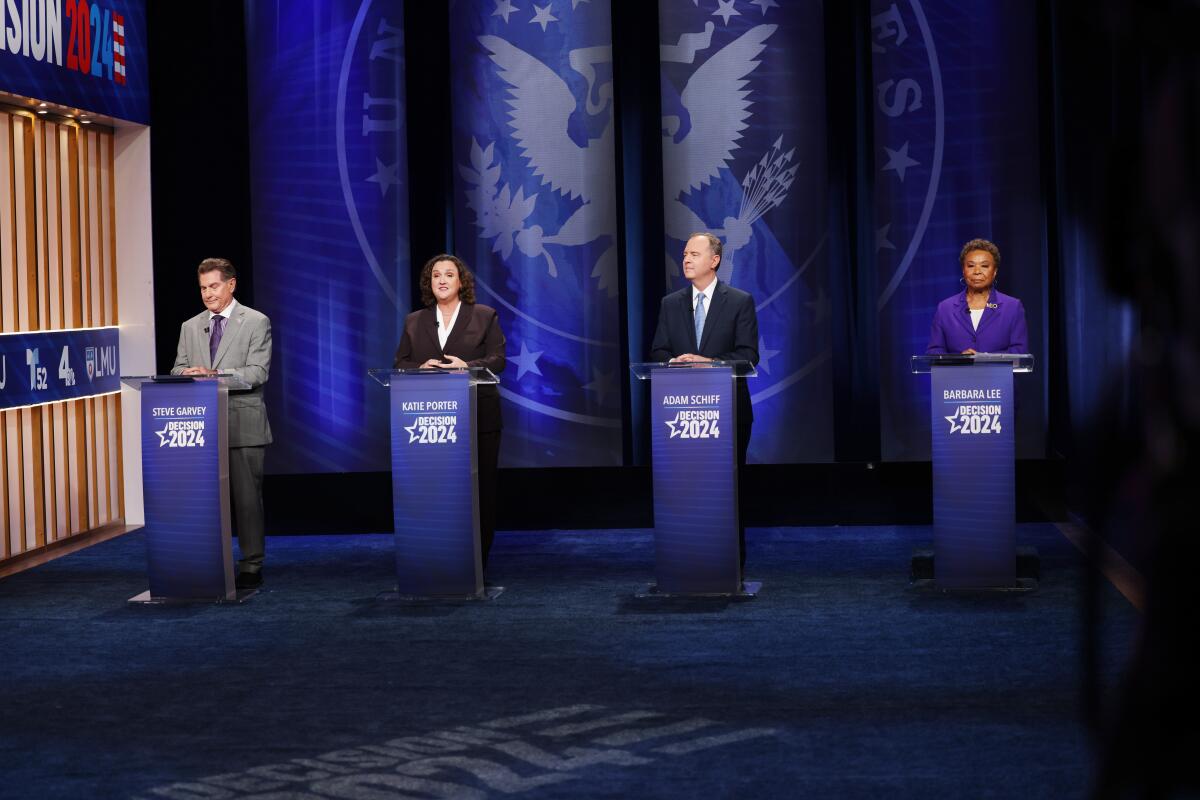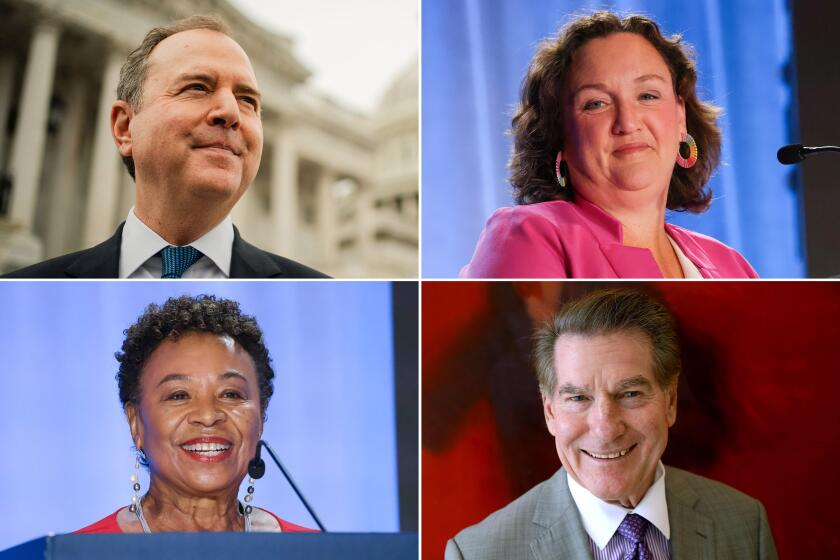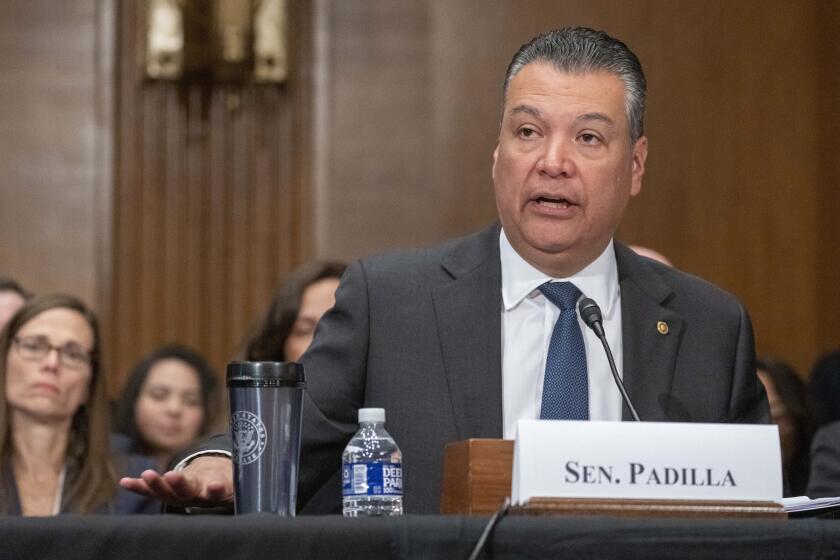California’s top-two primary creates twists and turns in Senate race

- Share via
SACRAMENTO — Next week’s primary election will determine whether California voters choose a new U.S. senator now, essentially, or continue the competition until November.
That’s because of California’s abnormal “top two” open primary system. The top two candidates who win the most votes, regardless of their party, will advance to the November election.
If it’s a Democrat and a Republican who advance, it will mean that the Democrat has already virtually clinched the seat held for 30 years by the late Sen. Dianne Feinstein. It’ll all be over except for the victory speech. There’ll still be a face-off in November, but it will be a “contest” in name only.
Candidates simply will go through the motions — the Republican with hardly any money from political investors and the Democrat with campaign cash to spare and a 2-to-1 voter registration advantage.
No Republican has won a statewide race in Democratic-dominated California since 2006. And none in this Senate field has a remote chance. There’s no Arnold Schwarzenegger or Ronald Reagan anywhere in sight for the California GOP.
But if voters send two Democrats to the general election, there’ll be stiff competition all the way to Nov. 5 — eight more months for voters to watch, listen and choose in a genuine contest.
What does it matter?
Real competition would give voters lots more time to weigh two candidates’ qualifications and policy positions — rather than just voting the party line as has become the custom in California and throughout polarized America.
Many Democratic pros, however, would prefer to wrap up the contest next week and save tens of millions of dollars. Instead of pouring those campaign bucks into a Senate race that some Democrat is guaranteed to win anyway, the money could be spent in hot congressional contests that will help determine which party controls the U.S. House.
The only 2024 statewide electoral contest is for Senate and includes Reps. Katie Porter, Barbara Lee and Adam B. Schiff along with former Dodger Steve Garvey.
The consistent leader in polls and fundraising has been Democratic Rep. Adam B. Schiff, 63, of Burbank, the undisputed front runner. It would be shocking if he didn’t finish first in the primary and qualify for the November election.
The fight for No. 2 has been nip-and-tuck between Democratic Rep. Katie Porter, 50, of Irvine and Republican former baseball star Steve Garvey, 75.
Porter could be tough competition for fellow Democrat Schiff in the fall.
Garvey would be an easy strikeout. And it’s not just because he’s a Republican. He also has never before held elective office or run a political race. And his deer-in-the-headlights rookie inexperience and policy vagueness have consistently shown.
Another Democrat, Rep. Barbara Lee, 77, of Oakland, has been trailing in fourth place, based on polls. And a second Republican, lawyer and perennial candidate Eric Early, 65, is running so far back he’s out of sight.
A poll of likely voters released last week by the nonpartisan Public Policy Institute of California showed Schiff leading with 24%, followed by Porter and Garvey in a virtual tie at 19% and 18% respectively. Lee was at 10% and Early at 4%.
Schiff showed particular strength among voters 45 and older while Porter was preferred by people younger than 45.
Porter and Lee divided the Democratic female vote — 26% for Porter and 17% for Lee. Schiff’s share was 34% — meaning that more Democratic women sided with the two female candidates than the male, but split their votes.
Another poll released last week showed Garvey running stronger. The Emerson College survey of likely voters found Schiff leading at 28% with Garvey running significantly ahead of Porter, 22% to 16%. Lee was at 9%.
That poll found independent voters split almost evenly between Garvey and Schiff.
Our top-two primary system has led to cynical advertising tactics by Schiff and now Porter. Schiff started it and Porter complained. Then she adopted the smelly strategy herself.
Rep. Adam B. Schiff (D-Burbank), the front-runner in California’s Senate race based on polling and campaign cash, is going full bore to boost Republican former baseball star Steve Garvey in the March 5 primary election.
Schiff has been running TV ads for weeks ostensibly attacking Garvey for being a two-time Donald Trump voter who could swing the Senate to GOP control. Schiff’s goal is to build up Garvey’s support among Republicans so he’ll beat out Porter for the No. 2 spot.
Porter finally responded by running an online ad aimed at helping Early draw MAGA votes from Garvey. Her spot says Early “proudly stands” with Trump while Garvey refuses to say who he’ll vote for in the presidential election. “He might even vote for Joe Biden.”
To their credit, the four leading candidates debated three times on TV, shedding some light on their policy positions.
In their final debate last week, all four contenders said they would have voted against the bipartisan border package that was backed by President Biden but blocked by Senate Republicans at Trump’s request. Trump desires to use the border crisis as a campaign issue.
Schiff called the compromise “lopsided” conservative, noting that California Democratic Sen. Alex Padilla opposed it. Porter said it “demonized immigrants.” Lee, the most liberal candidate, had been against the bill from the start. Garvey said “too many things [were] packed in there.”
Padilla says border state Democrats weren’t part of negotiating the immigration bill, which he says makes extreme changes to the asylum process.
Throughout the debates, Porter pressed her crusade against “earmarks” — the congressional “back scratching” practice of steering money toward local pet projects, perhaps in trade for a key vote. Porter insisted it’s “corrupting.” Schiff and Lee countered that it’s an upstanding way to deliver for local constituents — goodies like bridges, irrigation canals and parks. They’re right.
“I’ll bring home as much [project] money as I can,” Lee promised.
This is a race with twists and turns.
One twist: A vote in the primary for Garvey or Lee probably helps Schiff. Another: A vote for Early helps Porter.
It’s true — but somehow doesn’t seem right.
More to Read
Sign up for Essential California
The most important California stories and recommendations in your inbox every morning.
You may occasionally receive promotional content from the Los Angeles Times.

















